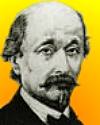 (source)
(source)
|
Germain Sommeiller
(15 Mar 1815 - 11 Jul 1871)
French-Italian engineer who built the Mount Cenis Fréjus Rail Tunnel (1857-70) through the Alps. To accomplish boring the world's first important mountain tunnel, he introduced the first industrial-scale pneumatics for task.
|
Surveying the Mont Cenis Tunnel
How can tunnels meet when bored from two sides of a mountain?
[p.175] Here the question may naturally arise: How can a tunnel, if commenced simultaneously at the sides of a range of mountains, be made to meet in the middle ? It is obvious that to avoid mistake on so vital a matter most careful scientific methods have to be adopted. In the first instance the centre line beneath which the tunnel will run, has, by the aid of a trigonometrical survey of the district to be fixed above ground. In the Mont Cenis work observatories were erected, at some distance from the entrance of the future tunnel, and marks were placed along the line—the accuracy of which was verified astronomically.
The transit instrument set up on Mont Cenis was first directed on the mark opposite to it on the mountains, and shining like a bright star ; its telescope was then tilted downwards until the flame of a lamp set up in the tunnel itself was accurately bisected by the cross hairs. This operation is repeated three more times, the instrument being re-levelled on each occasion, until the mean of the four observations formed what is called a 'series.' A second 'series' is then made by an [p.176] independent observer, and should the mean of the two agree to within a small fraction of an inch, the point denoted by the flame is correctly fixed, and a fresh one is sought for; but if there is much discrepancy in the observations, further 'series' are made until the mean of all the various positions of the lamp warrants the adoption of the point as a station." Such was the accuracy of the methods adopted, first for determining the axis of the tunnel laid out above ground; and, secondly, for transferring this axis underground, that the two tunnels pierced from opposite sides of the Alps, duly met.
- 15 Mar - short biography, births, deaths and events on date of Sommeiller's birth.
- The Mont Cenis Tunnel - Rock Boring: excerpt from Discoveries and Invention of the Nineteenth Century (1903).
- The Mont Cenis Tunnel - Chapter from Underground, or Life Below the Surface (1876).
- The Mont Cenis Tunnel Chapter from Underground, or Life Below the Surface (1876).
- Today in Science History event description for the opening of the railway through the Mont Cenis tunnel on 19 Sep 1871.




